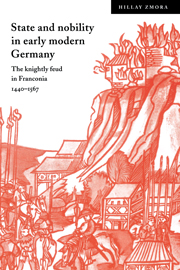Book contents
- Frontmatter
- Contents
- List of figures
- List of tables
- Preface
- List of abbreviations
- 1 The problem of the feud
- 2 The politics of violence: feuding in late medieval Franconia
- 3 The Franconian nobility
- 4 Prosopography of feuding noblemen
- 5 State, nobility, and lordship: the feud interpreted
- 6 The decline of the feud
- A note on Appendixes
- Appendix A Creditors and guarantors of the margraves of Brandenburg
- Appendix B Sample of intermarriages among the noble élite
- Appendix C Individual parameters of feuders (Sample-I)
- Appendix D Family parameters of feuders (Sample-I)
- Appendix E Individual parameters of feuders (Sample-II)
- Appendix F Family parameters of feuders (Sample-II)
- Sources of information for Appendix A
- Sources of Information for Appendixes C and D
- Sources of Information for Appendixes E and F
- Selected bibliography
- Index
- CAMBRIDGE STUDIES IN EARLY MODERN HISTORY
1 - The problem of the feud
Published online by Cambridge University Press: 29 October 2009
- Frontmatter
- Contents
- List of figures
- List of tables
- Preface
- List of abbreviations
- 1 The problem of the feud
- 2 The politics of violence: feuding in late medieval Franconia
- 3 The Franconian nobility
- 4 Prosopography of feuding noblemen
- 5 State, nobility, and lordship: the feud interpreted
- 6 The decline of the feud
- A note on Appendixes
- Appendix A Creditors and guarantors of the margraves of Brandenburg
- Appendix B Sample of intermarriages among the noble élite
- Appendix C Individual parameters of feuders (Sample-I)
- Appendix D Family parameters of feuders (Sample-I)
- Appendix E Individual parameters of feuders (Sample-II)
- Appendix F Family parameters of feuders (Sample-II)
- Sources of information for Appendix A
- Sources of Information for Appendixes C and D
- Sources of Information for Appendixes E and F
- Selected bibliography
- Index
- CAMBRIDGE STUDIES IN EARLY MODERN HISTORY
Summary
HISTORIOGRAPHY
‘All Germany is a gang of bandits and, among the nobles, the more grasping the more glorious’ – a Roman cardinal thus summed up the state of the German nation in the late Middle Ages. There was more to this remark than curial hauteur: complaints about the bad manners and violence of German noblemen were a commonplace among German literati as well. The latter were wont to base their criticism on an old European tradition which equated nobility with personal virtue rather than genetic qualities. This was a conviction to which aristocratic authors, too, were willing to subscribe. At the same time, they gave it a different interpretation. In his dialogue ‘The Robbers’ (1521), the Franconian noble and humanist Ulrich von Hutten made one of the characters, Franz von Sickingen, say that
I am of the opinion that virtue is not hereditary and that he who has to reproach himself with ignominious deeds should in no way be counted among the nobility, even if he were a prince … [I]f there was in our family one who, albeit descending from this lineage, still displayed in his life only sordid baseness – such a one I would not recognise as a relation or a kinsman, nor as a noble, and never have anything in common with him.
It is noteworthy that this harangue is delivered in the context of an argument between the three dramatis personae – Franz von Sickingen, Ulrich von Hutten, and a nameless merchant – over the right of noblemen to feud. The merchant denies that nobles have a self-contained authority to declare feuds.
- Type
- Chapter
- Information
- State and Nobility in Early Modern GermanyThe Knightly Feud in Franconia, 1440–1567, pp. 1 - 15Publisher: Cambridge University PressPrint publication year: 1998

